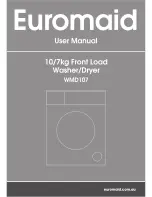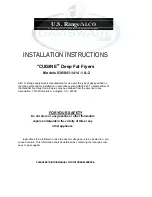
18
End of Cycle Signal Volume
The End of Cycle Signal produces an audible sound when the wash cycle is finished. This
signal is helpful when you are removing items from the washer as soon as it stops. Select On
or Off.
Operating Controls
Power
Press POWER to turn the washer on or off.
Start
Press START to start your washer after a cycle has been selected. Be sure all desired Modifiers
and Options have been selected. The lid must be closed for the washer to start.
Pause/Cancel
Press PAUSE/CANCEL once to pause or stop the washer at any time. Press PAUSE/CANCEL
once to unlock the lid and add a garment. Press START to complete the cycle from where it
was stopped. Press PAUSE/CANCEL twice to stop the wash cycle. The washer will then drain
and turn off.
Lid Lock
When the Lid Lock status light glows, the washer lid is locked.
NOTE:
You must wait until the Lid Lock Light turns off before the lid can be opened.
Normal Sounds
Your new washer may make sounds your old one didn’t. Because the sounds might be
unfamiliar, you may be concerned about them. These sounds are normal.
During washing
If you select the Stain Cycle option, you will hear a spin/spray noise at the start of the cycle.
During drain
If water is drained quickly from your washer (depending on your installation), you may hear
air being pulled through the pump during the end of draining.
During wash and spin
This washer does not have a transmission. The motor provides direct drive for agitation and
spin. You will hear sounds that are different from those of a conventional washer.
LAUNDRY TIPS
Preparing clothes for washing
Follow these recommendations to help you prolong the life of your garments.
■
Close zippers, snaps, and hooks to avoid snagging other items. Remove pins, buckles, and
other hard objects to avoid scratching the washer interior. Remove non-washable trim and
ornaments.
■
Empty pockets and turn them inside-out.
■
Turn down cuffs; brush away lint and dirt.
■
Turn synthetic knits inside-out to avoid pilling.
■
Tie strings and sashes so they will not tangle.
■
Mend tears, loose hems, and seams.
■
Treat spots and stains.
■
Stained or wet garments should be washed promptly for best results.
Sorting
■
Separate heavily soiled items from lightly soiled ones, even if they would normally be
washed together. Separate lint-givers (towels, chenille) from lint-takers (corduroy,
synthetics, permanent press). When possible, turn lint-givers inside-out.
■
Separate dark colors from light colors, colorfast items from noncolorfast items.
■
Sort by fabric and construction (sturdy cottons, knits, delicate items).
■
When washing waterproof items, such as plastic-lined mattress pads, shower curtains,
tarpaulin (tarps) or waterproof or water-resistant sleeping bags, use the Delicate or
Handwash cycle with the lowest spin speed setting available for the washer model that
you have.
Unloading
■
Remove clothes from washer after the cycle is completed. Metal objects such as zippers,
snaps, and buckles may rust if left in the washer basket for a long time.
















































